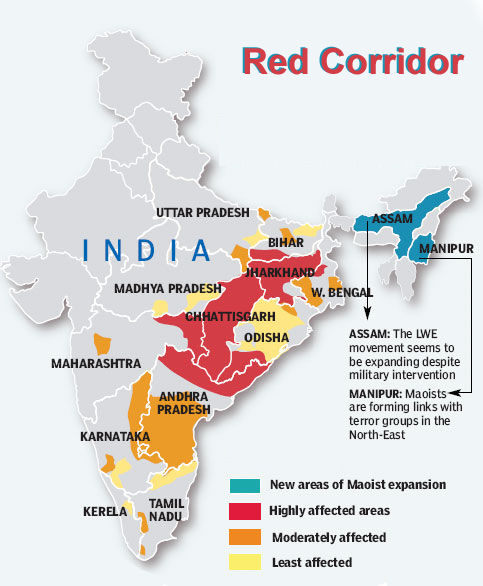From UPSC perspective, the following things are important :
Prelims level: Federal issues and Internal security;
Mains level: Naxalism in India;
Why in the News?
The Maharashtra state government has introduced a comprehensive new legislation – Maharashtra Special Public Security (MSPC) Bill, 2024, to address the growing incidence of Naxalism in urban areas.
- The Maharashtra government claims that Naxalism is no longer limited to remote rural areas, but has now spread its influence to urban centers through “frontal organizations”.
- The government argues that existing laws like the Unlawful Activities Prevention Act (UAPA) and Maharashtra Control of Organised Crime Act are not sufficient to effectively control these urban Naxal organizations.

Key provisions drafted under the MPSC Bill, 2024:
| Declaration of Unlawful Organizations | The bill empowers the state government to declare any organization as “unlawful” under Section 3.
An advisory board of three qualified individuals (current/former/qualified High Court judges) will review such decisions as per Section 4. |
| Definition of Unlawful Activities | The bill defines “unlawful activities” in broad terms, including “activities threatening public order, peace, and tranquility” (Section 2(f)(i)), “interference with law administration and public servants” (Section 2(f)(ii)), and “encouraging disobedience to law and institutions” (Section 2(f)(iv)). |
| Cognizable and Non-Bailable Offences | All offences under this law will be cognizable and non-bailable, and will be investigated by a police officer not below the rank of a Sub-Inspector as per Section 9. |
| Punishments |
|
| Seizure and Forfeiture | The District Magistrate or Commissioner of Police can notify and take possession of any place used for unlawful organization activities (Section 14). The government can also forfeit money and assets intended for unlawful organizations (Section 15). |
| Legal Review | An advisory board must review the declaration of unlawful organizations within six weeks and submit a report within three months (Section 4). The High Court can review government actions through revision petitions (Section 7). |
Why it is being seen as a threat to civil liberty:
- Vague Definitions of Unlawful Activities: The bill defines “unlawful activities” in broad and vague terms, including “activities threatening public order, peace, and tranquility” and “encouraging disobedience to law and institutions” in Section 2(f)(i) and (iv).
- Excessive Powers Granted to the State: The bill allows the state government to unilaterally declare an organization as “unlawful” without adequate judicial oversight in Section 3. It also empowers District Magistrates and Police Commissioners to grant permission for prosecution, bypassing the courts in Section 9.
- Threat to Civil Liberties and Press Freedom: The bill’s broad provisions in Sections 2(f) and 8 could be used to criminalize activities such as reporting on administrative failures or the plight of citizens, as seen in other states with similar laws. This poses a threat to press freedom and the right to freedom of expression.
- Lack of Transparency and Public Consultation: The bill was tabled hastily, with the draft not made available for public scrutiny and objections, as noted by civil society members.
Potential for Misuse and Abuse: Given the vague definitions in Section 2(f) and excessive powers granted to the state in Sections 3, 8 and 9, the bill has a high potential for misuse and abuse against political opponents, activists, and journalists, turning Maharashtra into a “police state”.
Way forward:
- Consultative Process: The Maharashtra government should engage in a consultative process with legal experts, civil society organizations, and stakeholders to refine the bill’s provisions, ensuring they align with constitutional principles and international human rights standards.
- Safeguarding Rights: Introduce safeguards such as judicial oversight in the process of declaring organizations unlawful, ensuring that fundamental rights like freedom of expression and assembly are protected while addressing legitimate security concerns effectively.
Mains PYQ:
Q Naxalism is a social, economic and developmental issue manifesting as a violent internal security threat. In this context, discuss the emerging issues and suggest a multilayered strategy to tackle the menace of Naxalism. (2022)
Get an IAS/IPS ranker as your 1: 1 personal mentor for UPSC 2024
